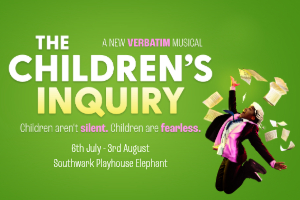The Children’s Inquiry at Southwark Playhouse Elephant – review
LUNG’s new verbatim musical runs until 3 August

“There’s an old saying in theatre that if something is too painful or difficult to say, you must sing it,” says Matt Woodhead, co-director of campaigning theatre company LUNG, and the co-writer and director of this exceptional verbatim musical.
Having explored injustices from Britain’s housing crisis to its role in the Iraq War, LUNG now turns to the children’s social care system. Through five years of interviews with four contemporary children in the system, plus archival testimonies and material, the show exposes 160 years of systemic failure. And music doesn’t simply show us a way through the pain – it intensifies it, like searing sunshine through a magnifying glass you know you mustn’t drop. From the first tolling of Big Ben, the unrelenting pain of the show’s content is focused by the inexorable pace and precision of performance – musical and otherwise.
Verbatim theatre will always cut to the quick of humanity, delivering truths with the kind of unassuming, revealing simplicity no playwright’s brain could ever conjure. “I never really hated my mum. I didn’t understand, I was so young” sings Jelicia, as she struggles to decide whether to return home. “I’ve memorised their phone numbers, I know their number plates, this is home now,” sings Frank, who is on his eighth foster family. Bewildered eyes search the audience asking “Was it my fault?” or raging, “We had no warning.” These truths are heartbreaking. But Woodhead and Helen Monks’s script compounds our heartbreak by constantly – dizzyingly – splicing these stories with those of the failed children that came before them.
This relentless energy is matched by Alexzandra Sarmiento’s choreography – ambitious and wide-ranging – and music from Owen Crouch and Clementine Douglas, a genre-spanning, technically demanding mix of soul, doo-wop, rave and pop, with a persistent baseline that drives onwards the merciless march of injustices. Woodhead’s direction is as slick and inventive as the system it explores is broken and unchanging. The set and characters transform constantly thanks to simple but deftly used props, smart lighting and some truly transporting movement sequences.
But here come the real stars of the show. The ten revelatory young performers (there are two ensembles that alternate nights) nail it all. Hitting miraculous high notes and rich harmonies, raising laughs with Spitting Image caricature lip-syncs of politicians, and portraying the fury and terror, resilience and resignation of children in care, with sensitivity that seems well beyond their years.
Watching them power on undeterred, through horror after atrocity, is a masterclass in energy and commitment. But it is also a moving testament to the strength of children, not to mention an uncomfortable stylistic paradox at times. They shimmy their way from the workhouses of 1857, through the murders committed by foster carer Amelia Dyer that led to the first child protection act. They belt out the pleas of WW2 evacuees, doo-wop through the plights of children shipped to Australia for a life of hard labour and sexual abuse, and sing and sashay as child refugees arriving in Britain to “more trauma than back home”. All of the children are repeatedly failed, through recessions and pandemics, until we reach Sir Keir Starmer’s promise that “change begins now.”
Every crisis triggers a new act or bill, a round of smug applause from its makers, and the tolling of Big Ben. If this device feels repetitive, it is deliberate: time marches on, and lessons are not learnt. If the mashing together of testimonies and timelines is disorienting, good. It serves as a tiny taster of the labyrinthine bureaucracy of the system, and the constant change and uncertainty children in care experience.
Pain is ever-present. But hope is, too. Not hope for the system. But hope for people, for empathy, for “unrelenting love”, and what it could achieve. This show is an urgent and sophisticated call to arms. And it’s one none of us should ignore.















